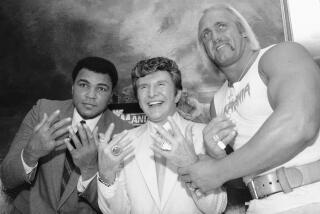Physical Ailments Have Done Little to Slow Ambassador Ali
- Share via
NEW YORK — Muhammad Ali’s hands tremble constantly. His speech is slurred and repetitious. His memory is faded. He walks with a shuffle. His face is puffy. And he is very serious, not the jovial, fun-loving, poem-spouting braggadocio he was when he was heavyweight champion of the world.
Yet, he is the most recognized athlete in the world--and perhaps the most recognized individual in the world, ahead of politicians and entertainers. Wherever he goes, in his wide travels, he is mobbed for autographs and handshakes.
“People, old ladies, coming out of rice paddies in China, in Peking, who never had a TV (came to see me),” Ali said, putting his fists into a fighting pose, then moving them up and down quickly to illustrate how the women greeted him on a trip to China this year.
Last year, Ali, trying to preach the Muslim religion and the teachings of Islam throughout the world, took “182 flights.”
Despite his physical deficiencies caused by Parkinson’s Syndrome, Ali the ambassador has not slowed down. His plans for the remainder of the year include trips to Bosnia to help the destitute and war-ravaged citizens there, China again to help promote a fight, and possibly Russia and Somalia.
“My main purpose in life is to be the world’s greatest ambassador, to spread the word of Islam,” said Ali, 50, whose expression becomes animated when he discusses religion.
Otherwise, he is subdued and low-key when he speaks. There are times, however, when he won’t even talk at all.
Tuesday, following moments of silence after questions, Ali finally opened up, discussing his life at present, not his past accomplishments, including his three-time reign as heavyweight champion.
He and 24 of the greatest athletes and coaches in history were honored at induction ceremonies at Madison Square Garden for the newly established “Walk of Fame,” similar to the entertainers’ “Walk of Fame” in front of Mann’s Chinese Theatre, formerly Grauman’s, on Hollywood Boulevard.
Joining Ali in the ceremonies, honoring the most memorable athletes in the Garden’s history, were basketball players Wilt Chamberlain, Oscar Robertson, Bob Cousy and George Mikan, hockey players Maurice Richard and Gordie Howe, former Knicks coach Red Holzman, the widows of track and field greats Jesse Owens and Glenn Cunningham and boxer Sugar Ray Robinson, and Richard Lapchick, son of former coach Joe Lapchick.
Others whose plaques were unveiled in the Garden lobby were basketball players Kareem Abdul-Jabbar, Larry Bird, Bill Bradley, Michael Jordan, Willis Reed and Bill Russell, Coach Nat Holman, boxers Jack Dempsey, Joe Louis and Jack Dempsey, hockey players Wayne Gretzky and Bobby Orr, and tennis player Rod Laver.
Ali’s most memorable fight in the Garden was March 8, 1971, when he suffered the first loss of his professional career and was beaten for the undisputed world heavyweight title, being outpointed by champion Joe Frazier in 15 rounds.
The bout was watched on television by 300 million people worldwide, with the fighters splitting a record $5 million.
He came back against Frazier on Jan. 28, 1974, outpointing him in 12 rounds and retaining the North American Boxing Federation title he had won four months after losing to Frazier by stopping Jimmy Ellis in 12 rounds.
Asked about those two brawls, plus a third, the memorable “Thrilla in Manila” on Oct. 1, 1975, in which Ali stopped Frazier in 14 rounds, he said, “Frazier was the toughest.”
Boxing, however, is far from Ali’s mind now.
“Boxing made me famous,” he said. “This (his relgious pursuits) is the real thing. My main goal is to work for Allah.”
To accomplish that goal, Ali stood in the Garden lobby, handing out religious pamphlets with his autograph.
More to Read
Go beyond the scoreboard
Get the latest on L.A.'s teams in the daily Sports Report newsletter.
You may occasionally receive promotional content from the Los Angeles Times.










